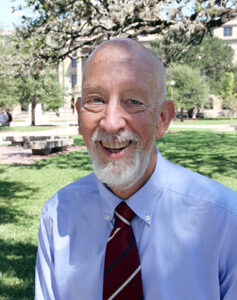Illuminating Humanities: Brian Linn
Highlighting Humanities Research and its Impact
Brian Linn | History
by Jennifer Wells '10

Dr. Brian Linn, Department of History, Texas A&M
The Glasscock Center is excited to continue its series which highlights humanities research at Texas A&M, and the vital role played by the humanities at the university and in the world beyond the academy.
For this highlight, we invite Dr. Brian Linn, to tell us about his Glasscock Internal Faculty Residential Fellowship supported by the Glasscock Center.
Dr. Brian Linn, a 2021-2022 recipient of the Glasscock Center's Internal Faculty Residential Fellowship, is the Ralph R. Thomas Class of 1921 Professor in Liberal Arts in the History Department at Texas A&M University. During his semester-long fellowship at the Glasscock Center, Dr. Linn completed the final draft of Real Soldiering: The US Army in the Aftermath of War, 1815-1980 (available here). His manuscript tracks the US Army's postwar policies and practices following the War of 1812 and ends in 1980, after the Vietnam War.
The chance to devote an entire semester to writing remains a rare luxury for most in academia, and Dr. Linn is "extremely grateful to the Glasscock Center" for its support. He also credits the Center's "stimulating intellectual community" with broadening his scholarly outlook. Through its initiatives, like inviting humanities experts to share their latest projects at free public-facing events, the Center promotes thoughtful conversations across disciplines.
Dr. Linn's interest in studying postwar periods emerged while working as a Visiting Professor at the Army War College between 1999 and 2000. He remembers being struck by the visceral reaction of US veterans to General Eric Shinseki's (Army Chief of Staff, 1999-2003) ambitious plan to transition the Army from what he considered its archaic Cold War ways to becoming a modern, technologically-savvy fighting force. Far from enthusiastic, many veterans expressed cynicism, like they had seen this all before. Dr. Linn wanted to understand their apathy.
General Shinseki's zeal for his postwar "transformation train" relied on widely-held assumptions regarding previous successes. For example, after the Vietnam War, officials claimed that the Army learned from its past mistakes and had gone about remaking itself for the better, heralding victory in the Gulf War as proof of its new and improved training tactics. But Dr. Linn remained skeptical. He resented how lawmakers and military commanders had skewed historical data to persuade others to adopt certain policies. He thought the evidence should speak for itself.
After scouring Army records, Dr. Linn realized that the challenges facing recovery procedures were eerily similar from one war to the next, no matter the decade. As a result, he organized his research around several recurring themes, including the immediate outcomes of war, the process of preparing for future wars, and the impacts of recovery agendas on both officers and enlisted soldiers.
Most postwar recovery narratives tend to focus on top-down directives. But Dr. Linn's findings indicate that such limited considerations do little to expose the untidy realities of on-the-ground soldiering. Higher-ups may issue brilliant doctrine, spend billions on equipment, and puzzle endlessly over the Army's organization, yet still fall short of achieving actual transformation.
Dr. Linn maintains that a genuine understanding of postwar periods only occurs when we shift our attention to focus on the soldiers themselves. What did their day-to-day experiences in a peacetime Army look like? How did such lofty prerogatives play out in muddy training fields and not-so-crowded barracks? According to Dr. Linn, the "real problems center on human beings being unable to exercise those concepts'' due to issues with recruitment, retention, and logistics. By "poking into this legend of recovering armies," Dr. Linn aims to "restore military history back to the human dimension."
As a military scholar who has spent years studying the ins and outs of the US Army, Dr. Linn's respect for the institution is evident. His writings reflect his admiration and expectation that it will live up to its reputation characterized by "self-sacrifice, dedication, and commitment to excellence." Dr. Linn asserts that most service members want to engage in honest conversations about the Army's past, not flatter themselves with reassuring fables. He states that officers and enlisted alike "are dedicated to improvement" because "they recognize that if they don't get it right, people die." Ultimately, Dr. Linn "hopes to have an impact on how both the public and armed forces understand today's current challenges" by using historical knowledge "to inform themselves and the American public of how they will fulfill their mission of defending the nation."For more, see Dr. Linn's latest journal articles in War and Society: "Evolving Grand Narratives: A Forty-Year Perspective " and "Forty Years On: Master Narratives and US Military History." You can also listen to an interview featuring Dr. Linn in the popular podcast series, "Military Historians are People, Too."
